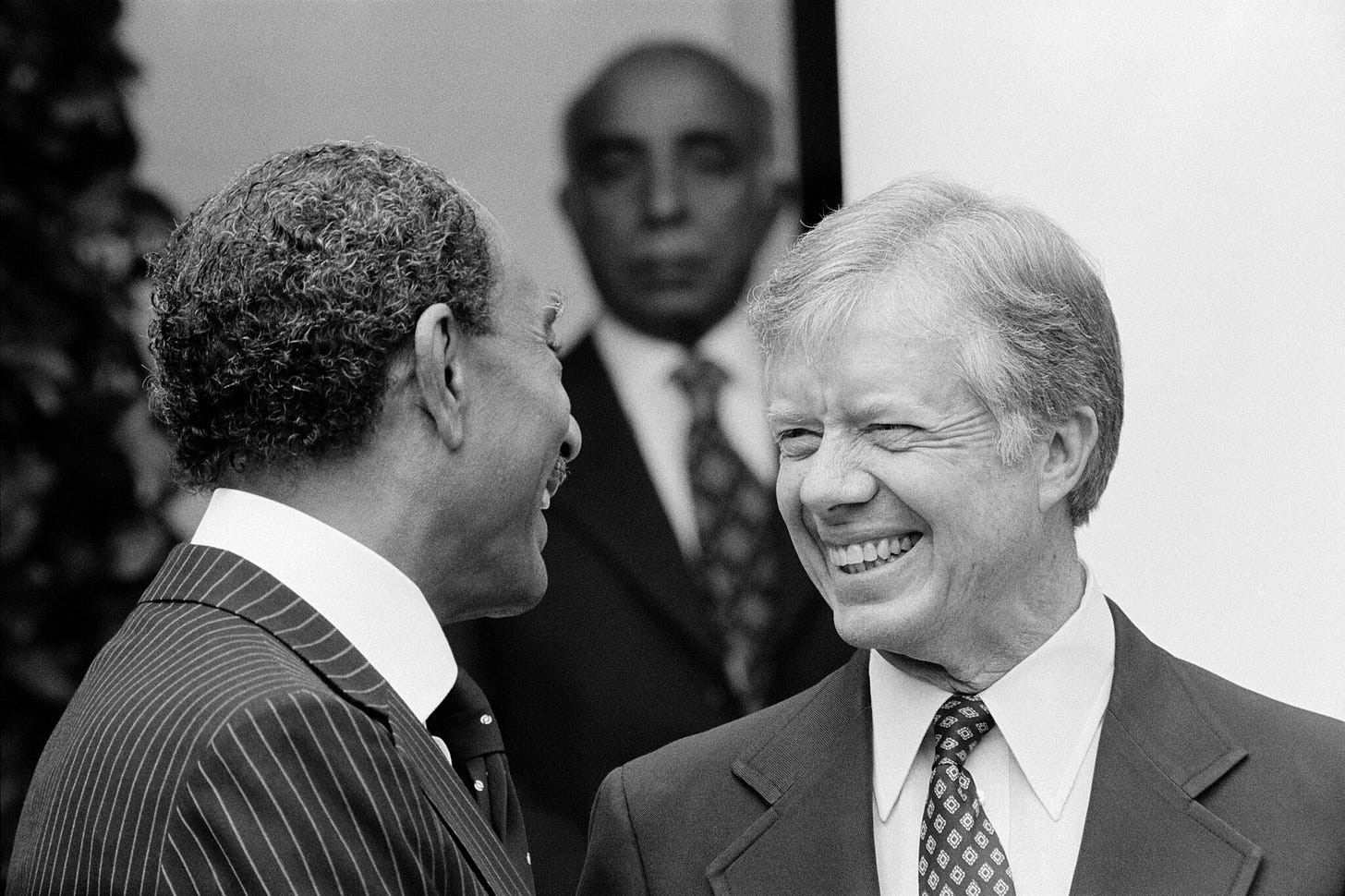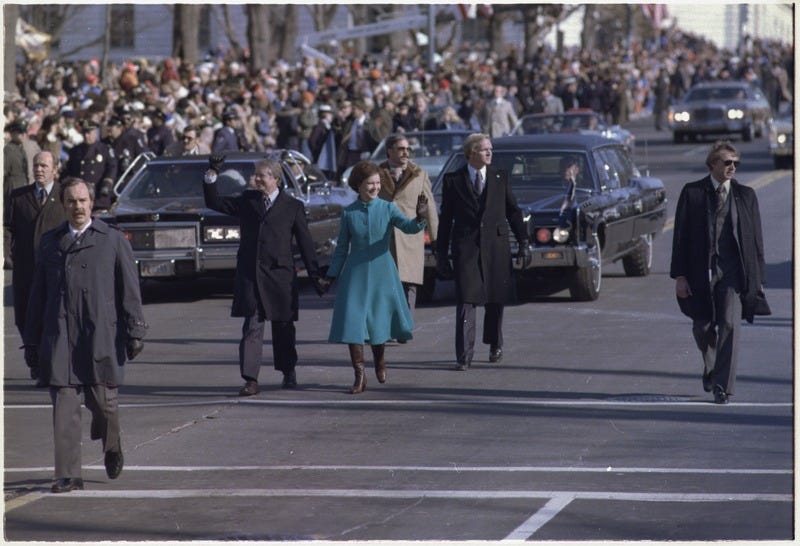I interviewed Jimmy Carter - there will never be another US president like him
The 39th president’s policies are receiving a fresh assessment but in terms of personal qualities he already stood alone
[Jimmy and Rosalynn Carter were married for 73 years. Image: Courtesy Wikimedia Commons]
You would assume it must he hard for some one such as Barack Obama to find themselves seated next to the likes of Donald Trump.
Especially so, at a formal, solemn occasion when the world is watching. Obviously you cannot spit on one another. But what would lead the two avowed enemies to smile and giggle?
And so perhaps that was the way Jimmy Carter had the last laugh on the political world he had left behind, with Obama and Trump, along with Bill Clinton, George W Bush and Joe Biden dressed in their best, funeral finery for the service at the Washington National Cathedral.
Vice President Kamala Harris did not escape the discomfort either, with herself and her husband Doug Emhoff, seated in the first row of seats next to Biden and Dr Jill Biden, who will carry the title of First Lady for a just a few more days.
Reports suggest since Harris lost to Trump in November, relations between Biden and the vice president have been cool so say the least. You can watch her stony-faced for yourself when Harris hears Obama and Trump chuckling, summoning all her powers of self control not to turn around and yell at them.
The American media often likes to talk about such occasions as instances of national healing, when people put aside their political differences and come together. I think it is anything but.
[Carter funeral at the Washington National Cathedral was attended by the five surviving US presidents. Image: Courtesy Wikimedia Commons]
What Carter’s funeral underscored, however, is that if you’re going to make it big in electoral politics there are times when you are required to play a game.
For Harris this week we saw her behave with impeccable grace, overseeing the certification of the electoral college votes that officially affirmed Trump - the man who attacked her with racist barbs before handily beating her in November - as President.
She then had to officiate the swearing in of newly elected senators, the husband of one of whom was too rude to shake her hand.
These are not games of course, but her constitutional duties.
But the make-nice with your sworn enemies is part of of the “game of polities” and one that Carter famously had little time for.
Reports say that when he and Rosalynn, his wife of 73 years, moved from the governors’ mansion in Georgia to Washington DC after his 1976 victory, he found little time for the group known as the Georgetown set.
The New York Times reported this week that the lack of trust or appeal was mutual.
The Georgetown set, encapsulated by the likes of Washington Post publisher Katharine Graham, dubbed Carter’s group the “Georgian mafia, dismissing them as a bunch of cocky rednecks from the hinterlands who did not know what they were doing”.
Carter had little interest in that aspect of the job, but it would cost him, as biographers would outline. Because he failed to build relationships on Capitol Hill and among the party’s powerbrokers, they did not have his back in the way they might have when he ran for reelection and lost to Ronald Reagan.
[Carter worked against the odds with Egypt’s Anwar Sadat, (l) and Israel’s Menachem Begin (not pictured) to secure peace deal that lasts to this day. Image: Wikimedia Commons]
Yet Jimmy Carter is probably more famous for what he did after he left the White House, establishing an institution in Atlanta that tackled long-ignored diseases in Africa, and overseeing election integrity around the world
“He built houses for people who needed homes,” Joshua Carter, one of grandsons, told the funeral service, recalling how Carter regularly taught Sunday school in the small town of Plains after leaving the White House.
He added: “He eliminated diseases in forgotten places. He waged peace anywhere in the world, wherever he saw a chance. He loved people.”
It was at the Carter Centre in Atlanta that I had the opportunity to meet and interview the former president 20 years ago.
The Independent had sent me after Carter agreed to talk about his latest book, The Hornet’s Nest: A Novel of the Revolutionary War. He would author as many as 30 over his life but this was the first novel. It was a little slow moving.
I was hoping he might be willing to talk about other things, including the invasion of Iraq that had been launched a year before and was already turning into deadly chaos.
To the angst of Tony Blair and Bush, there had been no sign of the weapons of mass destruction they claimed were controlled by Saddam Hussein, and had used as their primary justification for the war that would kill hundreds of thousands of people and devastate the country
[The Carters broke with tradition and walked down Pennsylvania Avenue during the 1977 inaugural parade. Image: Courtesy Wikimedia Commons]
Over the course of a half-hour interview, Carter would give my story, denouncing Blair and Bush for a war “based on lies”.
It was among the first criticisms of its kind at the time and earned my article a spot on The Independents’s front page.
At the time, I was pretty pleased with myself. Over the years what has stuck with me more that getting that “scoop”, is the experience of meeting the former president, dressed in a blazer and tie, and sitting in the lobby of the Carter Center as sun poured in through the window.
He was attentive, interested and respectful, and had a wonderful smile. When the interview was over he said: “I’ve enjoyed our conversation.”
Jimmy Carter was no saint.
In the days since his death at the age 100, people have recalled him as someone who did not suffer fools gladly, and was often angry if he did not get his way.
The writer, Lawrence Wright, who penned a play about the 1978 Camp David Accords brokered by Carter and President Anwar Sadat of Egypt, and Menachem Begin, the Israeli Prime Minister, said he benefited from the presence of his wife of more than 70 years, Rosalynn, who died in 2023 at the age of 96.
She was among the few who call talk to her husband with “unvarnished candour” and “unsparing insight”.
But if that was Carter’s worst fault - to think rather too highly of himself as he set about trying to make the world a better place - he feels like someone we’d gladly swap for many of the global leaders we have right now.







